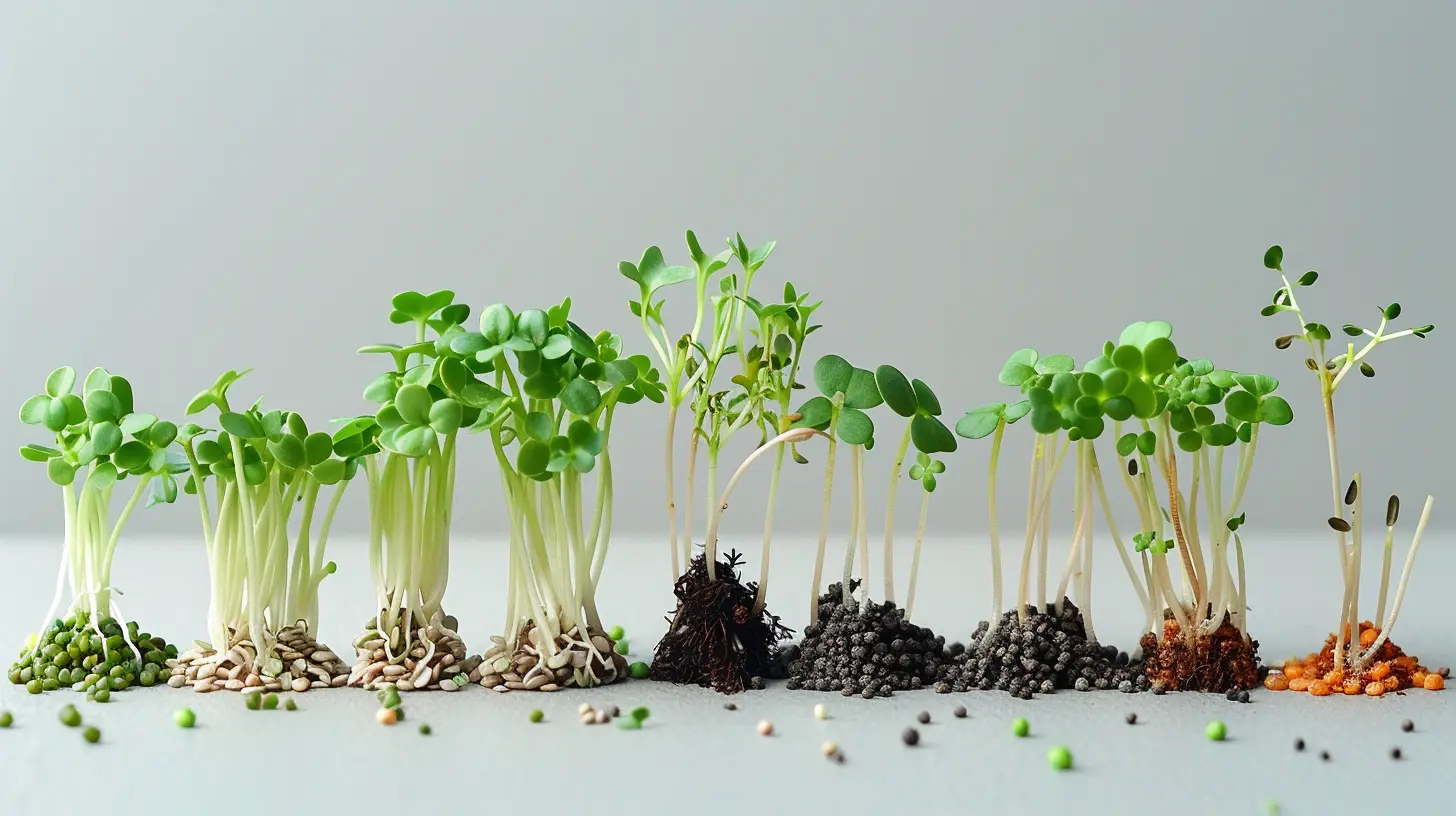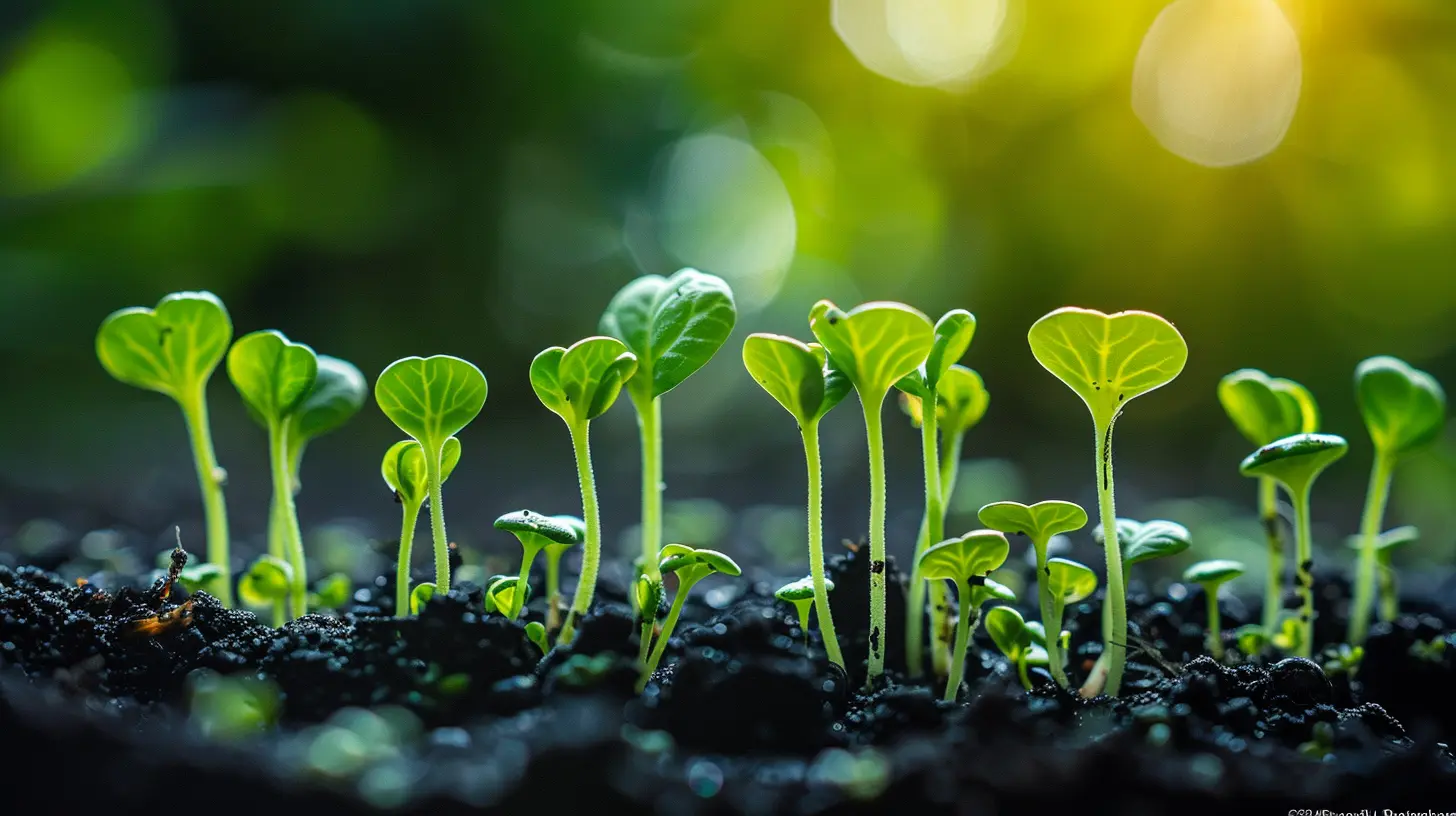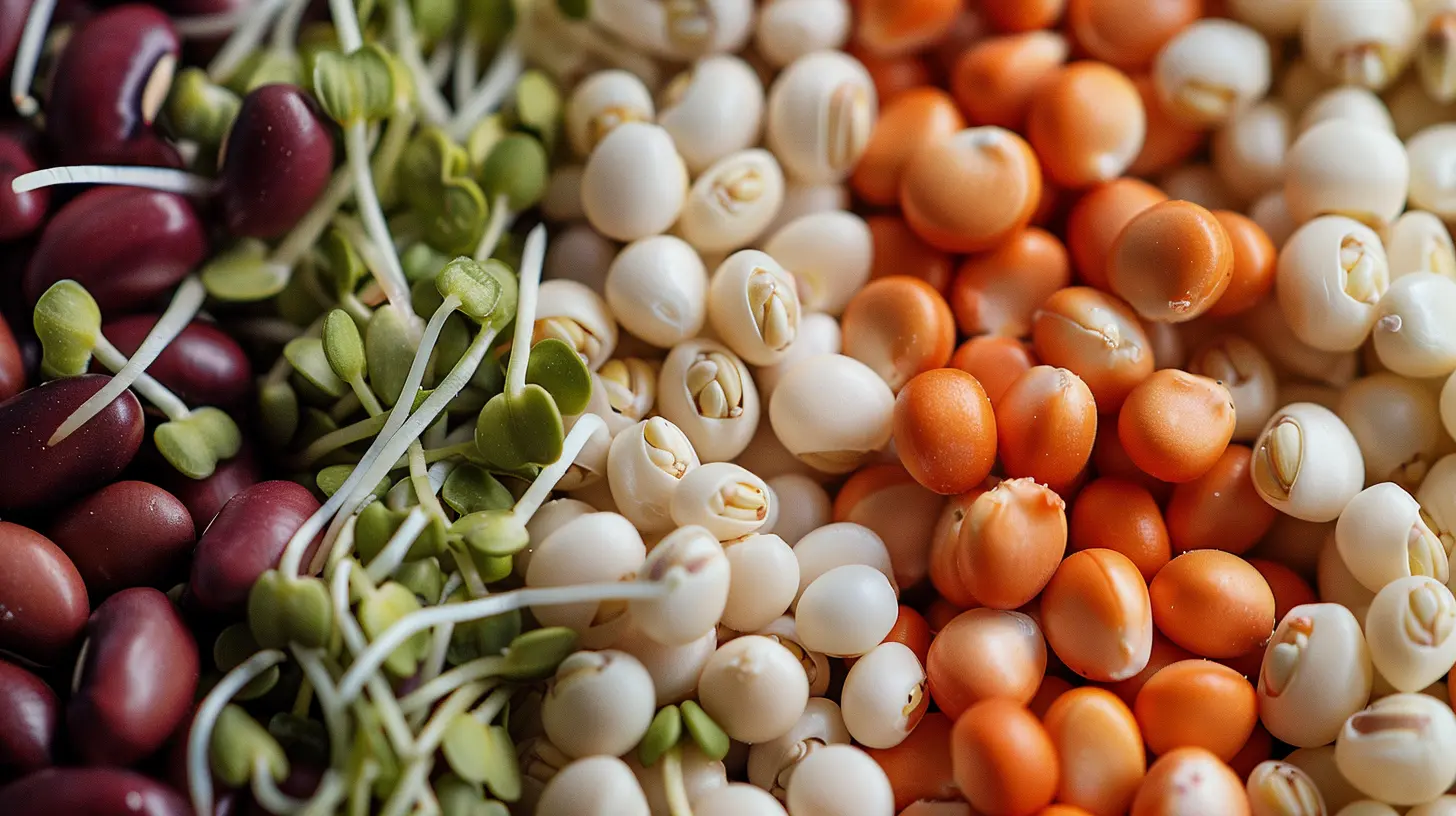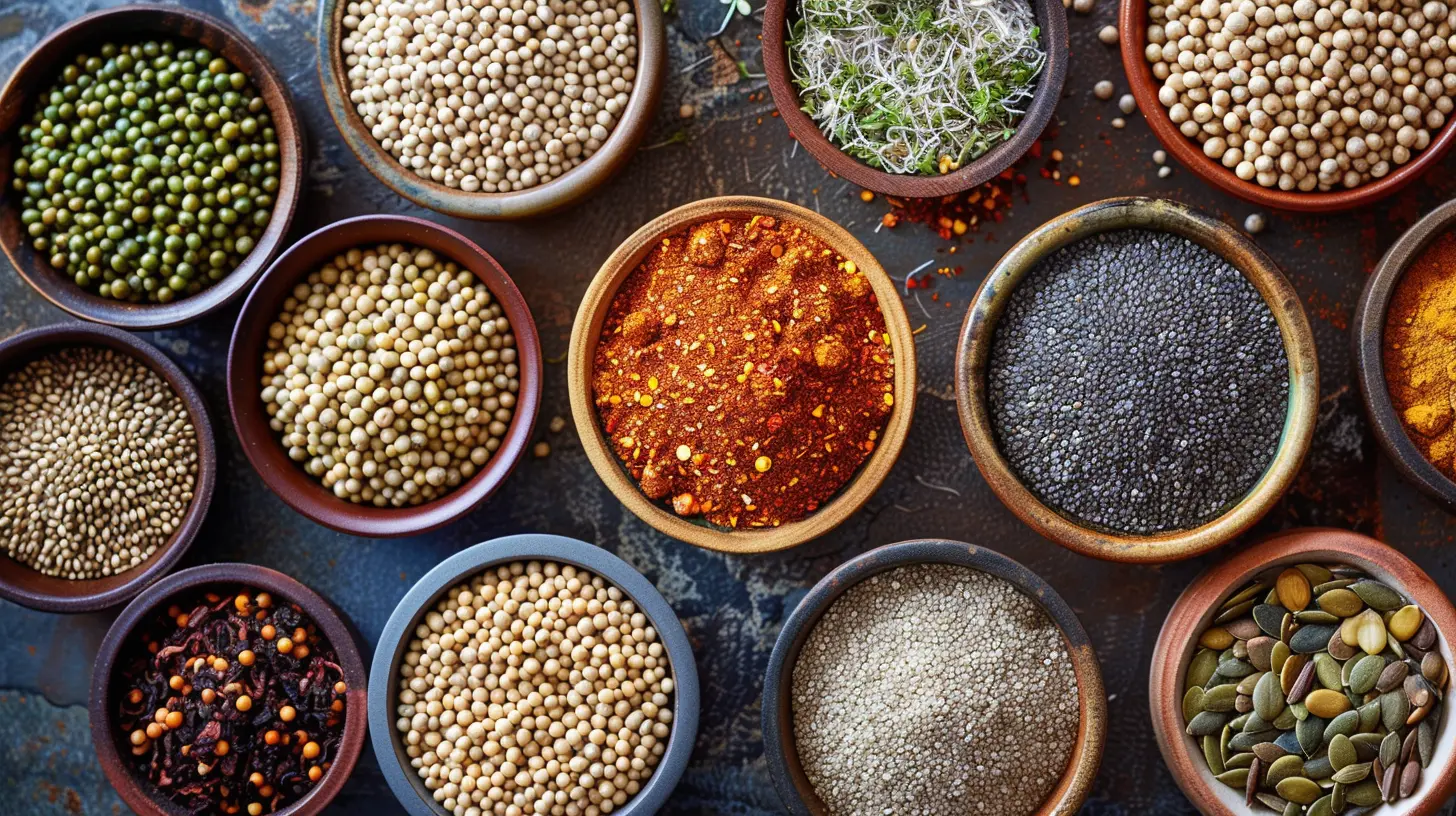Sprouting Seeds: The Ultimate DIY Superfood
6 January 2025
Have you ever thought about growing your own superfood right in your kitchen? Imagine snipping off fresh, crunchy sprouts to toss into your salads or layer on your sandwiches, knowing they’re packed with nutrients and grown by—you guessed it—you! That’s the magic of sprouting seeds. It’s easy, affordable, and incredibly rewarding, not to mention a perfect way to channel your inner green-thumb, even if you don’t have a backyard. In this guide, we’ll dive deep into all things sprouting seeds: how to do it, why you should, and the surprising benefits they bring to the table (literally and figuratively!).

What Are Sprouting Seeds?
Let’s start with the basics. Sprouting seeds are exactly what they sound like—seeds that are germinated just enough to produce little sprouting plants. These tiny, vibrant greens are jam-packed with nutrients, and their flavor ranges from mild and nutty to peppery and spicy, depending on the seed. You’ve probably seen alfalfa sprouts or mung bean sprouts on your plate at some point, but there’s a whole world of sprouting seeds beyond those two.Think broccoli, radish, lentils, sunflower seeds, clover, and even chia seeds! All of these can be sprouted, and the best part? You don’t need a garden or even soil to do it. Just a jar, some water, and a little love.

Why Sprouting Seeds is a Game-Changer
If you’re wondering why you should add another task to your already busy schedule, hear me out. Sprouting seeds is not just a fun DIY project; it’s a health-packed hobby that pays off in ways you probably didn’t know. Let me lay it out for you.1. Nutritional Powerhouse
Sprouts might be tiny, but they pack a serious nutritional punch. They’re often richer in vitamins, minerals, and enzymes than their unsprouted counterparts. Think of them as nature’s multivitamin. Want more vitamin C? Broccoli sprouts have you covered. Need a plant-based protein boost? Lentil sprouts are your best friend. Plus, they’re high in antioxidants, which help fight off free radicals that can damage your cells. In short, they’re like little edible jackpots of nutrition.2. Good for Your Digestive System
Ever feel bloated after eating legumes or grains? Sprouting can help with that. When you soak and sprout seeds, you essentially "wake them up," making their nutrients more bioavailable and easier to digest. It’s like giving your stomach a helping hand. The process also reduces anti-nutrients like phytic acid, which can interfere with nutrient absorption.3. Super Budget-Friendly
Let's face it—superfoods like goji berries or spirulina can put a serious dent in your wallet. Sprouting seeds, on the other hand, cost next to nothing. A small bag of seeds can produce jars full of fresh sprouts that last you weeks. It’s a win-win for your health and your budget.4. Easy and Sustainable
If you’re all about sustainable living, sprouting is for you. No packaging waste, no transportation emissions, and no synthetic fertilizers. Just you, your seeds, and a jar of water. It doesn’t get more eco-friendly than that.
How to Start Sprouting: Easy Step-by-Step Guide
Ready to grow your first batch of sprouts? Trust me, it’s simpler than you think. Here’s exactly what you need to do:Step 1: Gather Your Supplies
Here’s what you’ll need to get started:- A clean jar (a mason jar works perfectly)
- Sprouting seeds of your choice (look for organic, untreated seeds to avoid harmful chemicals)
- A piece of breathable cloth or a sprouting lid
- Fresh, clean water
Got everything? Great! Let’s move on.
Step 2: Rinse and Soak the Seeds
Give your seeds a good rinse to wash away any dirt or debris. Then soak them in water for 8–12 hours (overnight is easiest). This step hydrates the seeds and kickstarts the germination process.Step 3: Drain and Rinse
In the morning, drain the water from your jar and give the seeds another rinse. Make sure all the water is drained out so your sprouts don’t drown (nobody likes soggy sprouts!). Rest the jar at an angle, with the mouth facing downward, so air can circulate.Step 4: Rinse and Repeat
Now comes the easiest part: rinse and drain your seeds twice a day—once in the morning and once at night. It only takes a minute, but you’ll be amazed at how quickly those little guys start sprouting. Within 3–5 days, you’ll have a jar full of fresh, crisp sprouts ready to eat.
Tips and Tricks for Successful Sprouting
While sprouting is pretty foolproof, there are a few tips to ensure you get the best results:- Choose High-Quality Seeds: Always go for organic, untreated seeds. Not all seeds are meant for sprouting.
- Keep It Clean: Hygiene is crucial when dealing with food. Clean your jar thoroughly before starting, and always use fresh water for rinsing.
- Watch Out for Mold: If you notice an off smell or fuzzy patches, toss out the batch. Mold can occur if the seeds stay too wet or don’t get enough air circulation.
- Store Properly: Once your sprouts are ready, store them in the fridge in an airtight container. They’ll stay fresh for up to a week.
Delicious Ways to Enjoy Sprouts
So, you’ve grown your sprouts. Now what? The sky’s the limit! Here are some fun and tasty ways to incorporate them into your meals:- Salads: Toss them with greens, veggies, and your favorite dressing. Sprouts add crunch and a fresh, vibrant flavor.
- Sandwiches and Wraps: Pile them onto sandwiches or wraps for an added layer of texture and nutrition.
- Stir-Fries: Stir-fry mung bean sprouts with garlic and a dash of soy sauce for a quick side dish.
- Smoothies: Yep, you can blend sprouts into your smoothies! Broccoli or alfalfa sprouts work especially well.
- Soups and Bowls: Sprinkle sprouts over soups, Buddha bowls, or even scrambled eggs for a nutrient boost.
Are There Any Risks to Sprouting?
I wouldn’t be doing my job if I didn’t mention the flip side. While sprouts are generally safe to eat, they can occasionally harbor bacteria like salmonella or E. coli. Don’t worry, though—simple precautions can minimize risks:- Use clean, fresh water.
- Wash your hands and equipment thoroughly.
- Store sprouts in the fridge and eat them quickly.
If you’re pregnant, have a weakened immune system, or feel a bit nervous, cooking your sprouts is an easy way to eliminate any potential bacteria.
Why You’ll Fall in Love with Sprouting
When it comes to DIY health hacks, sprouting seeds is a no-brainer. It’s cheap, fun, and gives you a constant supply of fresh, nutrient-dense superfood. Plus, it’s oddly satisfying to watch these little seeds grow into vibrant greens right before your eyes. It’s like having a mini garden on your countertop!And let’s be real—who doesn’t want to eat food that makes them feel like a superhero? Whether you’re looking to boost your health, save money, or just try something new, sprouting seeds is a fantastic place to start.
Final Thoughts
Sprouting seeds is more than just a food trend—it’s a lifestyle change that reconnects you with the joy of nurturing life, even in its tiniest form. So why not dive in? Grab a jar, some seeds, and start sprouting your way to healthier days.all images in this post were generated using AI tools
Category:
SuperfoodsAuthor:

Tiffany Foster
Discussion
rate this article
13 comments
Brick Rios
Sprouting seeds is a fantastic way to boost your nutrition effortlessly! Not only are they packed with vitamins, but they’re also easy to grow at home. Embrace this simple DIY superfood journey and nourish your body with nature’s goodness!
February 18, 2025 at 4:07 PM

Tiffany Foster
Thank you! Sprouting seeds truly is a simple and rewarding way to enhance our nutrition with fresh, wholesome benefits. Happy sprouting!
Eli Sawyer
Great article! I never realized how easy sprouting seeds could be. Excited to try this superfood at home!
February 4, 2025 at 5:45 PM

Tiffany Foster
Thank you! I'm glad you found the article helpful. Enjoy your sprouting journey!
Valen Meyers
Who knew growing your own superfood could be so easy? Just add water and wait for your tiny green friends to pop up like they’re auditioning for a salad! Remember, if they start sprouting sunglasses, you might be onto something special!
January 31, 2025 at 3:33 AM

Tiffany Foster
Thanks for the fun comment! Sprouting really is a simple and rewarding way to enjoy fresh superfoods right at home—sunglasses optional! 🌱😊
Tank McAnally
What a fantastic guide to sprouting seeds! Embracing this DIY superfood not only enhances our nutrition but also connects us with nature. It’s a simple yet impactful way to boost your health and well-being. Let’s get sprouting and nourish our bodies with these vibrant nutrients! 🌱✨
January 26, 2025 at 4:44 AM

Tiffany Foster
Thank you! I’m glad you found the guide inspiring. Let’s all enjoy the benefits of sprouting and nourishing our bodies together! 🌱✨
Liv McGinnis
Who knew superfoods could sprout right in our kitchen? Time to channel my inner gardener!
January 20, 2025 at 4:58 AM

Tiffany Foster
Absolutely! Sprouting seeds is an easy and rewarding way to enjoy fresh superfoods at home. Happy gardening!
Zarek Morgan
Absolutely love this article on sprouting seeds! It's a fantastic reminder of how easy and rewarding it can be to enhance our diets with superfoods. Can't wait to try out some of these sprouting techniques at home. Thanks for the inspiration and valuable tips!
January 17, 2025 at 5:51 AM

Tiffany Foster
Thank you so much! I'm thrilled you found it inspiring and can't wait for you to try sprouting at home! Happy sprouting! 🌱
Courtney Barron
Great insights on sprouting! Can't wait to try!
January 11, 2025 at 5:01 PM

Tiffany Foster
Thank you! I’m excited for you to try sprouting—enjoy your superfood journey!
Tala Phelps
Empowering to grow health!
January 10, 2025 at 4:27 PM

Tiffany Foster
Thank you! I'm glad you found it empowering! 🌱
Kinsley James
Sprouting seeds is an accessible way to enhance your diet with nutrient-dense superfoods. This process boosts vitamins, minerals, and enzymes, making sprouts a powerful addition to meals. Easily grown at home, they offer significant health benefits and versatility.
January 8, 2025 at 5:24 PM

Tiffany Foster
Absolutely! Sprouting seeds is a simple and effective way to boost your nutrition with fresh superfoods right from home. Enjoy the health benefits and versatility they bring to your meals!
Arianth McCall
Sprouting seeds is a simple yet powerful way to enhance your nutrition. These tiny powerhouses are packed with vitamins and enzymes, making them a vibrant addition to any healthy diet.
January 8, 2025 at 3:34 AM

Tiffany Foster
Absolutely! Sprouting seeds not only boosts nutrition but also adds flavor and texture to your meals. They're a fantastic, easy way to supercharge your diet!
Kylie McCray
Great insights on the benefits of sprouting seeds! Excited to try this DIY superfood at home.
January 7, 2025 at 3:48 PM

Tiffany Foster
Thank you! I'm glad you found the insights helpful. Enjoy your sprouting adventure!
Zorina Harris
While sprouting seeds offers numerous nutritional benefits, it’s crucial to emphasize safety and hygiene to avoid potential bacterial growth. Balance is key; they shouldn't replace a varied diet.
January 6, 2025 at 5:53 PM

Tiffany Foster
Thank you for your insightful comment! Safety and balance are indeed essential when incorporating sprouted seeds into a diet.
Milena Phelps
Embrace the power of sprouting! These tiny seeds hold immense potential for your health and vitality. By taking this simple step, you're not just nurturing plants, but also fueling your body with essential nutrients. Let's spark our wellness journey together—one sprout at a time! 🌱✨
January 6, 2025 at 3:27 AM

Tiffany Foster
Thank you! Sprouting seeds truly are an incredible superfood that can elevate our health, one seed at a time! 🌱✨
MORE POSTS

Are Organic Fruits and Vegetables Really More Nutritious?

Yoga Poses for a Healthier Heart

Strength Training with Limited Equipment: Home Workout Tips

Debunking Popular Fitness Myths That Hold You Back

Plant-Based Fats: Why They Matter in a Vegan Diet

Why Superfoods Should Be a Staple in Your Pantry

Childhood Asthma: Recognizing Symptoms and Managing the Condition

The Importance of Movement in a Sedentary World

Organic Meal Prep Ideas for Busy Individuals